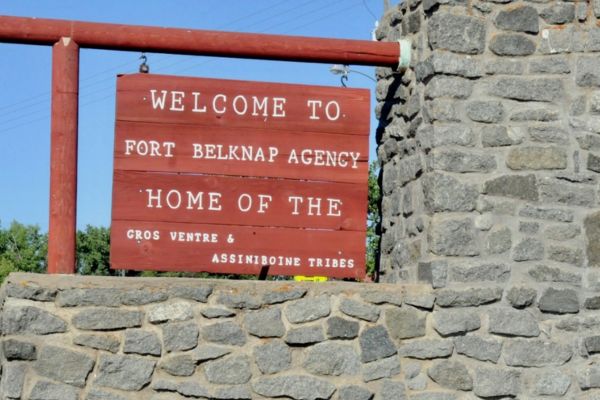
- Details
- By Levi Rickert
In a powerful letter to federal leadership, the Rocky Mountain Tribal Leaders Council (RMTLC) has issued a clarion call for immediate and coordinated federal action to combat the crisis of violent crime, drug trafficking, and missing and murdered Indigenous persons (MMIP) across Indian Country—specifically within Montana, Wyoming, and Idaho.
The RMTLC represents the interests and sovereignty of tribal nations in the Rocky Mountain region. The letter addressed to Doug Burgum, secretary of the U.S. Department of the Interior and the head of the U.S. Department of Justice, Attorney General Pam Bondi, urges the two departments to jointly implement a comprehensive public safety strategy, developed in direct collaboration with tribal governments.
Despite long-standing treaty obligations and statutory duties, federal support has significantly declined even as crime has surged. This has been exacerbated by the current Trump administration’s federal government spending in Indian Country since January and the proposed FY 2026 federal budget that calls for a 27% reduction on spending on law enforcement in Indian Country.
This concern was made known on Tuesday when Rep. Mike Simpson (R-ID) said during a welcome to Secretary Burgum at a House Appropriations budget hearing: “we likely do not see eye to eye with – especially when it comes to Indian programs.” Simpson went on to mention Burgum the need to prioritize this year’s funding to address the greatest Tribal needs including education, law enforcement, and land management issues.
American Indian communities face some of the highest rates of violent crime in the U.S.—homicide rates are four times higher than those for non-Hispanic Whites, and half of all Native women report being victims of violent crimes. The situation is worsened by the fact that many perpetrators are non-Natives, leaving tribal justice systems hamstrung due to jurisdictional gaps.
The letter highlights troubling statistics: while the Native population in the region has doubled since 2000, violent crime has tripled, and the number of tribal police officers has dropped by 50%. These alarming trends point to a dire need for enhanced and sustained federal law enforcement support in tribal areas.
Federal law, including the Indian Law Enforcement Reform Act and the Major Crimes Act, mandates federal responsibility for law enforcement in Indian Country. Tribal nations, under the doctrine of self-determination, also retain sovereign authority to maintain public safety. RMTLC emphasizes that the solution lies in a coordinated partnership—not in study, but in action.
The Council calls for the creation of a Joint Task Force on Violent Crime in Indian Country, co-chaired by the Secretary of the Interior, the Attorney General, and tribal leaders. This task force would also include U.S. Attorneys, the FBI, BIA's Office of Justice Services, and other key federal agencies. Its mission: to fight violent crime, resolve MMIP cases, disrupt drug trafficking, and support rehabilitation for non-violent offenders.
RMTLC urges the government to move away from fragmented, competitive grant programs that tribal governments often cannot manage due to administrative burdens. Instead, it calls for Major DOJ Block Grants, full funding of tribal police, and greater use of Public Law 93-638 and Public Law 102-477 authorities, which enable self-governance and integrated public safety programs.
The letter concludes with a request for a joint meeting of the Interior and DOJ Tribal Advisory Task Forces by the end of June, signaling a strong desire to transition from rhetoric to results. Backed by National Congress of American Indians Resolution LV-24-078, the RMTLC's message is clear: the time for action is now. Tribal nations must be equal partners in ensuring justice, safety, and the protection of Native lives across Indian Country.
More Stories Like This
Native News Weekly (August 25, 2024): D.C. BriefsUS Presidents in Their Own Words Concerning American Indians
Merry Christmas 2025
Navajo Man Faces Vehicular Homicide Charge After Child Killed at Navajo Nation Christmas Parade
Next on Native Bidaské: Lumbee Tribal Chairman John Lowery
Help us defend tribal sovereignty.
At Native News Online, our mission is rooted in telling the stories that strengthen sovereignty and uplift Indigenous voices — not just at year’s end, but every single day.
Because of your generosity last year, we were able to keep our reporters on the ground in tribal communities, at national gatherings and in the halls of Congress — covering the issues that matter most to Indian Country: sovereignty, culture, education, health and economic opportunity.
That support sustained us through a tough year in 2025. Now, as we look to the year ahead, we need your help right now to ensure warrior journalism remains strong — reporting that defends tribal sovereignty, amplifies Native truth, and holds power accountable.
 The stakes couldn't be higher. Your support keeps Native voices heard, Native stories told and Native sovereignty defended.
The stakes couldn't be higher. Your support keeps Native voices heard, Native stories told and Native sovereignty defended.
Stand with Warrior Journalism today.
Levi Rickert (Potawatomi), Editor & Publisher


